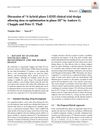
Continuous research and innovative strategies are essential for sustainable development.
 April 2019 in “Biometrics”
April 2019 in “Biometrics” The new clinical trial design is promising but needs real-world trials to test its effectiveness and possible enhancements.

Stem cells regenerate tissues and their behavior varies by environment, suggesting the hematopoietic system model may need revision.
 September 2016 in “Princeton University Press eBooks”
September 2016 in “Princeton University Press eBooks” The document concludes that understanding health requires considering evolutionary perspectives on reproductive fitness, and recognizing the complexity of factors like diet, testosterone, and sexual orientation.

North American ginseng extract helped regrow hair in balding mice.
 96 citations,
July 2014 in “Cold Spring Harbor Perspectives in Medicine”
96 citations,
July 2014 in “Cold Spring Harbor Perspectives in Medicine” The document concludes that adult mammalian skin contains multiple stem cell populations with specific markers, important for understanding skin regeneration and related conditions.
 9 citations,
July 2022 in “EMBO molecular medicine”
9 citations,
July 2022 in “EMBO molecular medicine” Blocking certain immune signals can reduce skin damage from radiation therapy.
 47 citations,
June 2012 in “Genes & Development”
47 citations,
June 2012 in “Genes & Development” A mother's western diet can make her milk toxic, causing inflammation and hair loss in babies.
 November 2023 in “Aktualʹnì problemi sučasnoï medicini”
November 2023 in “Aktualʹnì problemi sučasnoï medicini” The guidelines suggest using various treatments, including antidepressants and steroids, for alopecia areata and discuss the condition's genetic and immune aspects.
22 citations,
September 2020 in “The journal of investigative dermatology/Journal of investigative dermatology” The study's results on the effectiveness of low-dose IL-2 for alopecia areata and its impact on immune cells were not provided.
8 citations,
April 2016 in “Experimental dermatology” B6.Cg-Tyr c−2J Hr hr /J mice have a stronger delayed sunburn reaction and are good for UV research.
276 citations,
April 2003 in “Molecular endocrinology” Vitamin D is important for bones, hair, blood pressure, and breast development.
31 citations,
July 2021 in “ImmunoTargets and therapy” Alopecia areata is an incurable autoimmune condition causing hair loss, with research aiming for better treatments.
 July 2023 in “Journal of Biomedical Science”
July 2023 in “Journal of Biomedical Science” Different people show different symptoms for genetic diseases because of how sensitive their bodies are to small changes in important factors.
October 2022 in “Biomedicines” Finasteride in male rats causes liver and metabolic issues in their offspring.
62 citations,
January 2015 in “Journal of Dermatological Science” New genetic discoveries may lead to better treatments for alopecia areata.
56 citations,
October 2016 in “Journal of dermatological science” New insights into the causes and treatments for the autoimmune hair loss condition Alopecia areata have been made.
 15 citations,
January 2020 in “Experimental Dermatology”
15 citations,
January 2020 in “Experimental Dermatology” The document concludes that understanding and treatments for alopecia areata have significantly advanced, now recognizing it as an autoimmune disorder.
 7 citations,
February 2023 in “Inflammation and Regeneration”
7 citations,
February 2023 in “Inflammation and Regeneration” The protein interleukin-1 alpha helps regenerate hair follicles and increase stem cell growth in mice.
6 citations,
November 2020 in “Clinical Cosmetic and Investigational Dermatology” Both concentrations of triamcinolone acetonide are effective for hair regrowth in patchy alopecia areata, but 5 mg/mL is recommended to reduce side effects.
18 citations,
August 2011 in “Medical Hypotheses” Physical inactivity is a primary cause of many human illnesses.

The reviewers suggest major revisions for clarity and inclusion of recent findings on inflammation's role in cancer.
63 citations,
July 2018 in “The journal of investigative dermatology/Journal of investigative dermatology” JAK inhibitors can effectively reverse hair loss in people with alopecia areata.
30 citations,
June 2017 in “Journal of cutaneous medicine and surgery” Topical ruxolitinib failed to regrow hair in a 66-year-old with alopecia areata.
22 citations,
November 2016 in “International journal of molecular sciences” Vitamin D receptor is important for regulating hair growth and wound healing in mice.
 January 2024 in “Journal of tissue engineering”
January 2024 in “Journal of tissue engineering” Sunlight exposure damages hair follicles, but certain stem cell-derived particles can reduce this damage and help with hair regeneration.
 May 2023 in “Journal of managed care & specialty pharmacy”
May 2023 in “Journal of managed care & specialty pharmacy” Alopecia areata causes hair loss and life quality issues; current treatments are often unsatisfactory, but new drugs like JAK inhibitors show promise.
1 citations,
January 2018 in “Skin appendage disorders” The complement system might be involved in the development of alopecia areata and could lead to new treatments.
 14 citations,
January 2017 in “Skin appendage disorders”
14 citations,
January 2017 in “Skin appendage disorders” Simvastatin/ezetimibe did not effectively treat severe alopecia areata and caused side effects in some patients.
 January 2024 in “Deleted Journal”
January 2024 in “Deleted Journal” Essential oils like lavender, chamomile, and bergamot help manage stress and improve well-being.

















